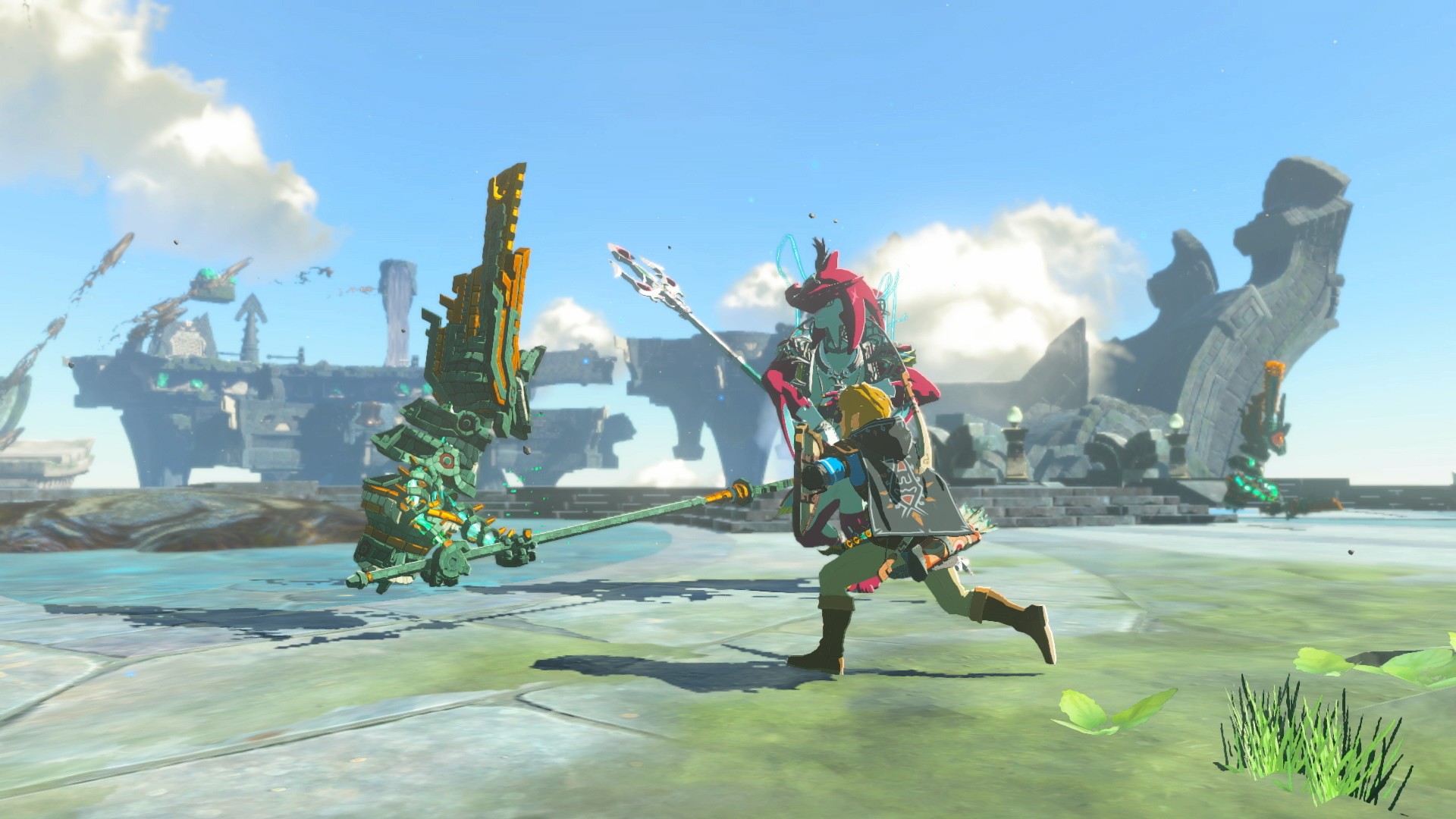Weapon durability can be a decent idea on paper, but it requires additional mechanics and tweaks to balance out the experience. While Nintendo hasn’t quite gotten the hang of replicating the classically enjoyable weapon durability system, it created an alternative that is pure chaotic fun.
It’s no secret that The Legend of Zelda: Breath of the Wild is a great example of how not to implement weapon durability. Many gamers and critics criticized how Link could only whack enemies a few dozen times with a sword before the weapon would inevitably break. In most games with weapon durability mechanics, items usually last five times as long, and even then, they still let players extend the item’s lifespan with a repair feature. There’s no such option in Breath of the Wild. Unsurprisingly, many players begged Nintendo to either do away with the durability system in the next Zelda game, or at the very least make the mechanic a little less punishing. Instead, the company produced something more novel.
For those who haven’t played Tears of the Kingdom, players can unlock the ability to fuse virtually everything that isn’t nailed down to weapons. This includes various rocks, monster body parts, and even other weapons. This system only helps stave off the inevitable decay and disintegration of items since you can’t repair weapons — unless you feed it to an octorok. You still have to scour Hyrule for new weapons, but in my opinion Fuse makes the process a lot more enjoyable this time around.
Tears of the Kingdom’s weapon fusion system doesn’t force players to rely on enemy weapons as much anymore and encourages experimentation. Say you found a Zonaite motherlode but don’t have any hammers to knock the ore loose. Instead of backtracking and hoping to find one, Fuse lets you make your own hammer. Combine any weapon with a rock lying around or a Moblin horn from your inventory, and you’ve got yourself a hammer. However, it’s when you start mixing weapons and other items with unorthodox parts that the fusion system really starts to shine.
Combining weapons with lootable items (and rocks) is a solid choice for most of the game. With the right monster horn or ore, you can even give weapons elemental properties (but once they break, you lose both the weapon and the attached materia). You can also fuse weapons with other weapons, which don’t look as clean,but make for great glass cannons. While these weapons are pretty fragile, they also have insane reach, and their pieces break individually. Say you encounter a Stalkoblin and steal its arm. That’s a weapon that disintegrates in 2 hits, but each swing deals 20 damage each. Now fuse another Stalkoblin arm onto it. Now you’ve got a weapon with twice the range and twice the damage, and once it breaks, you’ve still got the first arm, perfectly fresh and wriggling. So long as you don’t strike anything with the humerus, you’ve got a semi-permanent weapon with high damage output. These kinds of results demand experimentation. What else can you create by fusing two items? The answer comes when you experiment with Zonai devices and shields.
Most Zonai items are just simple tools for solving puzzles and creating constructs. But some have offensive uses. The Flame-Emitter is a particularly good example since it’s basically a flamethrower. The most obvious ways to fuse this item involve stapling one to your shield to turn the phrase “a good defense is a good offense” on its head, as well as a spear to poke opponents with fire. But you can also fuse the Flame-Emitter with other weapons, including boomerangs. The result is a veritable fire tornado that engulfs everything it touches — including Link.
As for shields, unfortunately most items don’t work with them. Attaching spikes to a shield won’t let you damage enemies just by running into them, and fusing a boulder with a shield won’t increase its defense stat, but slapping a bomb onto a shield will blow up in an enemy’s face if they’re dumb enough to strike it. You don’t even need anyone to strike it to set it off; just initiate a shield surf to launch Link high in the air, ready for a slo-mo arrow snipe. That said, the best combination material for a shield is a minecart since it turns the shield into a skateboard.
Admittedly, not every fusion combination seems useful in Tears of the Kingdom. For instance, you can combine a Zonaite fan with shields or a Korok leaf with weapons, but they only blow enemies away and deal zero damage. What good does that do when you’re in open fields? None, but when you’re on a floating island or high up on a cliff, a stiff gust of wind can easily dispatch opponents with lethal fall damage. Sure, you can’t retrieve their spoils, but that’s a small price to pay for saving yourself some weapon durability and aggravation.
While these fusion results sound wacky and fun, are they really a replacement for a proper weapon repair system? Well, let me answer your question with another question: If you could repair weapons in Tears of the Kingdom, would you feel the urge to experiment with fusions, or would you just keep the most OP one you could find until you unearthed a new OP weapon? Honestly, most gamers would do the latter and never bother with any other mechanics. You’d miss out on combining a beam emitter with a boomerang — as well as finding out how hilariously destructive the result is.
As they say, necessity is the mother of invention. Is it annoying that you still have to constantly have to change up your weapons to survive? Yes, but if the game didn’t force players to seek out new gear, they’d be missing out on the real fun.
